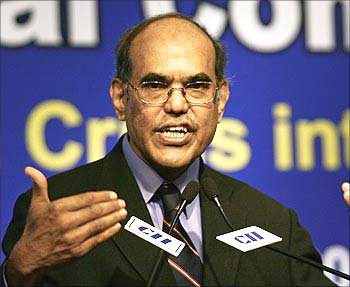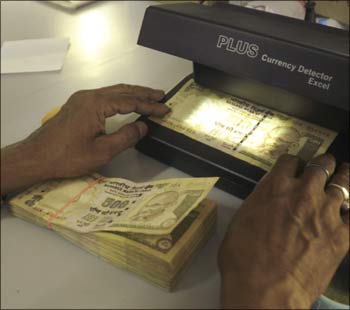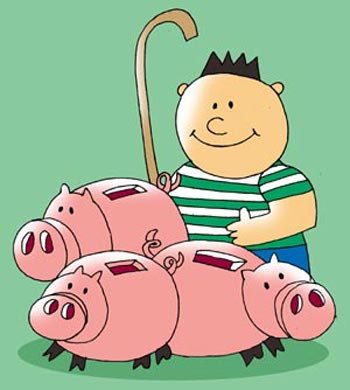 | « Back to article | Print this article |
Markets: 6 things to expect in 2010
At the end of 2008, banks were staring at a slowing economy, souring retail loans and a tanking stock market. The focus, especially of private and foreign banks, was on containing losses rather than growing.
A year on, the outlook is much more positive. In 2010, public sector players, which have done a bulk of the lending over the last 15 months, are going to strengthened with the government set to start the Rs 15,000-crore (Rs 150 billion) recapitalisation programme. Even employees would be better off with wage revision and a second pension option kicking in by March.
The market is also expected to be strengthened with new instruments such as credit default swaps and take-out financing.
Credit default swaps
Despite the Reserve Bank of India's (RBI's) concerns, the derivatives juggernaut is rolling. After currency futures and interest rate futures, credit default swaps (CDS) are expected to be launched soon.
It is a swap contract in which the buyer of the CDS makes a series of payments to the seller and, in return, receives a payoff if the underlying credit instrument, such as a bond or a loan, goes into default.
In the first stage, it is expected that only banks will be allowed to participate. Bankers say RBI is likely to introduce CDS as an exchange-traded instrument, unlike in most overseas markets where it is an over-the-counter product.
This will ensure transparency in valuations of contracts but may create liquidity issues as clients will have to pay margins.
"This is a product with a 100 per cent downside risk. So, exchanges will require significant margin requirement and it may become tough to find buyers," said a private bank executive. Margin refers to the percentage of the total traded amount that buyers have to pay upfront. Click NEXT to read on further. . .
Markets: 6 things to expect in 2010
More currency future pairs
Trade in euro-rupee, yen-rupee and pound-rupee contracts will be allowed soon. RBI is in the process of formulating guidelines for trading in these currency pairs.
A currency futures contract is a transferable instrument that specifies the price at which a specified currency can be bought or sold at a future date.
"This is a positive move since it will allow small importers, exporters and SMEs (small and medium enterprises) to hedge their currency risk," said U Venkataraman, executive director at MCX Stock Exchange. Euro-rupee contracts are likely to be the most traded contracts after the dollar-rupee, given that the trade between India and Euro zone is quite heavy. Click NEXT to read on further. . .
Markets: 6 things to expect in 2010
Take-out financing
With a bulk of the lending in recent months confined to the housing and infrastructure sector, banks are staring at an asset-liability mismatch (ALM). As a result, banks are now eagerly awaiting the take-out financing products which are expected to be re-launched by India Infrastructure Finance Company.
Though there are concerns among banks about the norms proposed by IIFCL, 2010 may see banks availing of these products to address the ALM concerns.
The government estimates that IIFCL and banks will be able to support core sector projects worth Rs 100,000 crore (Rs 1,000 billion) and IIFCL will be able to refinance 60 per cent of commercial banks' loans for PPP projects. Click NEXT to read on further. . .
Markets: 6 things to expect in 2010
Easier cash withdrawals
In a couple of weeks, customers will be able to enter any store with a point-of-sales terminal and withdraw up to Rs 1,000 by swiping their debit cards. They need not make a purchase to avail of this facility. Bankers say the cost to customers is unlikely to be more than Rs 15 per transaction. The floor charge will be Rs 10.
A number of banks are ready to roll out this service as early as January. Public sector lender Union Bank of India has submitted its proposal to RBI and is awaiting the central bank's nod to introduce this facility. Another public sector lender, Corporation Bank, will offer the service soon, according to a senior bank executive. Click NEXT to read on further. . .
Markets: 6 things to expect in 2010
Rs 15,000 crore capital boost
If 2009 witnessed private sector lenders tapping the equity market for capital, 2010 will see a host of government-owned banks boosting their equity capital to cater to the growing economy's credit requirement and adhere to global norms.
The government is expected to pump in around Rs 15,000 crore with the help of multilateral loans.
Additional capital is being provided to help banks grow faster since there is a cap on government holding falling below 51 per cent. Already, State Bank of India, Uco Bank, Central Bank of India and Vijaya Bank have got a capital booster.
Next year may witness equity infusion by the government, which will result in an increase in the Centre's holding in Bank of Baroda, Oriental Bank of Commerce and Dena Bank, among others. In addition, the remaining unlisted public sector banks -- United Bank of India and Punjab & Sind Bank -- will tap the capital market with initial public offers. Click NEXT to read on further. . .
Markets: 6 things to expect in 2010
Bank mergers
At least two mergers are expected to be completed next year. State Bank of India is expected to merge State Bank of Indore with itself in early part of the year. Next up will be the Federal Bank-Catholic Syrian Bank merger.
The government is also likely to move on consolidation of public sector banks.






